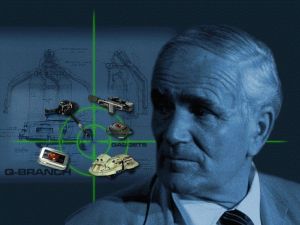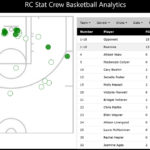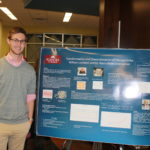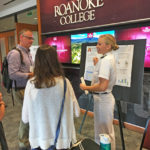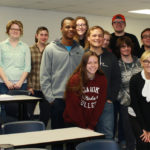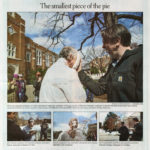What do our graduates do with a physics or mathematics major? For years, one of our answers has been “assistant director of the FBI” but until recently I did not know the details of our distinguished alumnus, William A. (Al) Bayse. Some surreptitious sleuthing unearthed excerpts from books about the FBI, including recently declassified information about Assistant Director Bayse.
Al Bayse received a B.S. in physics from Roanoke College in 1958. He went on to graduate school in mathematics, engineering and technology management. If that sounds like a professional student without professional ambitions, get ready for a plot twist. Al went to NASA as an aeronautical research engineer, then to the Department of the Army as the deputy chief of staff for logistics in the Data Processing Center. His work there earned him a Decoration for Meritorious Civilian Service, and impressed the FBI enough that he became the first non-agent to serve as assistant director when he was hired in 1978.
Bayse was put in charge of automating the FBI, with a focus on providing agents with immediate information in the field. He helped to develop knowledge-based expert systems and artificial intelligence applications for the bureau. All of those technical college courses were put to good use.
What was he like? According to Ronald Kessler in his book The FBI, he was “charming and smart.” And a bit of a geek. “If he can use a technical term to describe a new computer development, he will.” And an outstanding worker. “Bayse is in his element showing off some of the artificial intelligence systems his 1026-employee division has developed.” As head of technology, he was known to other assistant directors as “Q.” (This was the name of James Bond’s technology mastermind.)
The transcript of the keynote talk he gave in 1991 at the First Conference on Computers, Freedom, and Privacy reveals an accomplished leader with a good sense of humor. Before polling the audience about one issue, he announced that it was to be “a ‘Bayseian’ survey – because I really don’t have any choice in that matter.” (An important but controversial branch of statistics is known as Bayesian statistics.)
After quoting Charles Kettering (“We should all be concerned about the future, because we’ll have to spend the rest of our lives there.”), he told the assembled high-ranking representatives from various agencies, “We are going to be spending time together in the future – I sort of insist on it.” He then dove straight into the issues facing the industry, very modern issues of privacy versus agents’ need for information.
He took large numbers of questions and challenges from the audience, answering them with the charm and wit that won over Kessler. Sandeep Gupta describes the scene. “There has never been anything like this. Without any prodding, without any preparation, people in the audience simply begin to ask questions. Longhairs, freaky people, mathematicians. Bayse is answering, politely, frankly, fully, like a man walking on air. The ballroom’s atmosphere crackles with surreality.”
Clearly, Al Bayse had a way with people and difficult issues. His combination of technical expertise, social awareness, and leadership skills is the goal of a liberal arts education at Roanoke College.
What can you do with a physics or mathematics degree? If you’re Al Bayse, you can be one of the most important intelligence officers in the world!
(excerpt from The FBI by Ronald Kessler)
(excerpt from The FBI: A Comprehensive Reference Guide edited by Athan Theoharis)
http://cpsr.org/prevsite/conferences/cfp91/bayse.html/
(transcript of conference, Computer Professionals for Social Responsibility website)
(excerpt from Hacking in the Computer World by Sandeep Gupta)
By the way, my Dad, a one-time FBI agent, would have defined surreptitious as “belief that liquid maple poured on pancakes brings good luck.”
If you have further information about Al Bayse, please leave a comment!
